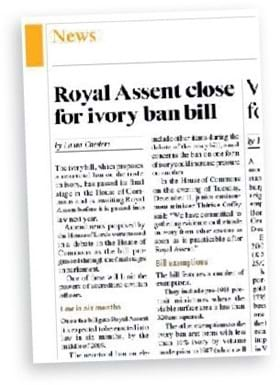One of the first things that springs to mind is Prohibition. Now that didn’t work out too well, did it? Well, not entirely true.
It glamorised the speakeasy, it cost the government billions of dollars in lost revenue, millions to enforce and unnecessary loss of life as a result of the turf wars.
The only ones to benefit were the bootleggers, gangsters, corrupt officials and everyone who like a good drink. I’m sure you get the point.
It has been illegal to sell unworked rhino horn in the UK since CITES was ratified in August 1976, yet in my opinion some auction houses have been doing just that and flouting the regulations ever since they came into effect. I can provide the name of one such auction house without fear of any contradiction.
“When the value of these items increases due to their scarcity, then so too will the level of poaching – isn’t the how the law of supply and demand works?
Turned a blind eye
It has been my experience that the authorities charged with the regulation and enforcement of the laws have been remiss in their duties and have on occasion turned a blind eye and cocked a deaf ear to blatant offences. In other words, they have cherry-picked which offences to investigate and which to ignore.
That said, I feel that certain members of the government are simply pandering to populist sentiment with scant regard for the livelihood of many conscientious and law-abiding dealers or the financial repercussions that will be borne by collectors who have diligently obeyed the law.

The latest ivory ban story, from ATG No 2372.
Is the government going to ban all items containing palm oil because of the catastrophic global effects on flora, fauna and climate? Or perhaps when the vegetarians shout loud enough, ban all meat production and put all producers out of work without a second thought or any compensation?
A complete ban on ivory won’t stop the illegal trade any more than Prohibition led to sobriety.
In fact, history shows us that the more scarce and difficult it becomes to obtain an item, the more attractive and valuable it becomes to those who would have it at any cost. It would also fuel corruption and other criminal activity.
My strong belief is that the ban won’t stop the poaching of even one elephant, or any other animal or plant that has any significant monetary value.
In fact, I believe that the exact opposite will occur. When the value of these items increases due to their scarcity, then so too will the level of poaching. Isn’t that how the law of supply and demand works?
The government and all the relevant agencies/departments have thus far categorically failed to regulate and enforce CITES since 1976 – so why does it think a total ban will change anything at all?
Lost taxes but extra costs
It will not only lose revenue in the form of taxes but will also incur additional costs in the form of regulation and enforcement.
However, if the past is anything to go by, at least that amount will only be minimal if anything at all.
Better regulation and enforcement is the answer and not a complete ban which will ultimately prove to be totally ineffectual as far as criminals are concerned (isn’t that the reason they are called criminals?) but will have devastating effects on the honest law-abiding dealers and collectors.
Won’t this reward the crooks and punish the honest?
F Segolini












